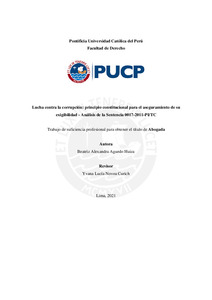El sistema se apagará debido a tareas habituales de mantenimiento. Por favor, guarde su trabajo y desconéctese.
Lucha contra la corrupción: principio constitucional para el aseguramiento de su exigibilidad - Análisis de la Sentencia 0017-2011-PI/TC
| dc.contributor.advisor | Novoa Curich, Yvana Lucía | |
| dc.contributor.author | Aguedo Huiza, Beatriz Alexandra | |
| dc.date.accessioned | 2021-08-12T21:07:49Z | |
| dc.date.available | 2021-08-12T21:07:49Z | |
| dc.date.created | 2021 | |
| dc.date.issued | 2021-08-12 | |
| dc.identifier.uri | http://hdl.handle.net/20.500.12404/19940 | |
| dc.description.abstract | El objetivo general del trabajo es presentar un análisis de los problemas jurídicos encontrados en la sentencia del Tribunal Constitucional No. 0017-2011-PI/TC, la cual versa sobre la demanda de inconstitucionalidad contra algunas disposiciones de la Ley 29703 que modificaron el art. 384 (delito de colusión) y el artículo 401 (tráfico de influencias del Código Penal). Para realizar el análisis, primero se desarrolló lo contenido en la doctrina y la juriprudencia; después, se describió el razonamiento del Tribunal plasmado en la sentencia, para al final presentar la postura y el análisis jurídico personal. En primer lugar, se identificó la afectación de la interpretación sobre el bien jurídico del delito de colusión en virtud de la modificación dada por la Ley 29703, la cual desprotegía el bien jurídico indicado por el Tribunal e iba en contra del principio constitucional de lucha contra la corrupción como mandato de exigibilidad hacia el legislador. Un segundo problema identificado fue el extremo del fallo del Tribunal en relación a la concepción del tráfico de influencias simulado, lo cual consideramos que fue en contravención al principio constitucional de lucha contra la corrupción al no proteger adecuadamente al bien jurídico de dicho delito. Asimismo, se identificó que el Tribunal no desarrolló correctamente el mencionado principio de proscripción como parte de su argumentación en toda la sentencia, lo cual hubiera permitido una mayor comprensión de su mandato para todo el ordenamiento jurídico. Finalmente, el Tribunal no se pronunció sobre la jerarquía normativa de la Convención ONU al no desarrollarlo en la sentencia, por lo cual somos de la interpretación que se consideró dicho tratado como una norma interpuesta, parte del bloque de constitucional con el cual se evaluó la constitucionalidad de la Ley 29703. | es_ES |
| dc.description.abstract | The general objective of the report is to present an analysis of the legal problems found in the Peruvian Constitutional Court ruling No. 0017-2011-PI / TC, which deals with the unconstitutionality claim against some provisions of Law 29703 that modified art. 384 (crime of collusion) and article 401 (influence peddling) of the Peruvian Criminal Code. To carry out the analysis, first the content of the doctrine and jurisprudence was developed; later, the reasoning of the Court embodied in the sentence was described, in order to finally present the position and personal legal analysis. In the first place, the impact on the interpretation on the legally-protected right of the crime of collusion was identified by the modification given by Law 29703, which unprotected such legally protected right indicated by the Court and went against the constitutional principle of fighting against corruption as an enforceability mandate from the legislator. A second problem was the extreme of the Court's ruling in relation to the conception of simulated influence-peddling crime, which we consider to be in violation of the constitutional principle of fighting corruption by not adequately protecting the legally-protected right of said crime. Likewise, it was identified that the Court did not correctly develop the aforementioned principle of fighting against corruption as part of its argumentation throughout the judgment, which would have allowed a better understanding of its mandate for the entire legal system. Finally, the Court did not rule on the normative hierarchy of the UN Convention against Corruption by not developing it in the judgment, for which we are of the interpretation that said treaty was considered as an interposed norm, part of the constitutional body of law, from which the unconstitutionality of Law 29703 was declared. | es_ES |
| dc.language.iso | spa | es_ES |
| dc.publisher | Pontificia Universidad Católica del Perú | es_ES |
| dc.rights | info:eu-repo/semantics/openAccess | es_ES |
| dc.rights.uri | http://creativecommons.org/licenses/by-sa/2.5/pe/ | * |
| dc.subject | Corrupción administrativa--Perú | es_ES |
| dc.subject | Tribunales Constitucionales--Jurisprudencia--Perú | es_ES |
| dc.subject | Delitos de los funcionarios--Perú | es_ES |
| dc.title | Lucha contra la corrupción: principio constitucional para el aseguramiento de su exigibilidad - Análisis de la Sentencia 0017-2011-PI/TC | es_ES |
| dc.type | info:eu-repo/semantics/bachelorThesis | es_ES |
| thesis.degree.name | Abogado | es_ES |
| thesis.degree.level | Título Profesional | es_ES |
| thesis.degree.grantor | Pontificia Universidad Católica del Perú. Facultad de Derecho. | es_ES |
| thesis.degree.discipline | Derecho | es_ES |
| renati.advisor.dni | 45449191 | |
| renati.advisor.orcid | https://orcid.org/0000-0002-3406-100X | es_ES |
| renati.author.dni | 72609248 | |
| renati.discipline | 215106 | es_ES |
| renati.juror | Chanjan Documet, Rafael | es_ES |
| renati.juror | Novoa Curich, Yvana | es_ES |
| renati.juror | Rodriguez Castro, Carolina | es_ES |
| renati.level | https://purl.org/pe-repo/renati/level#tituloProfesional | es_ES |
| renati.type | https://purl.org/pe-repo/renati/type#trabajoDeSuficienciaProfesional | es_ES |
| dc.publisher.country | PE | es_ES |
| dc.subject.ocde | http://purl.org/pe-repo/ocde/ford#5.05.02 | es_ES |






